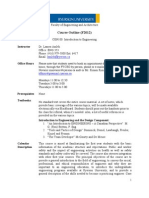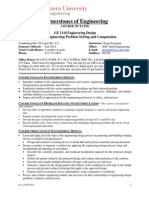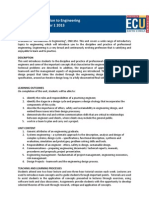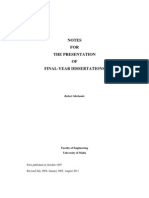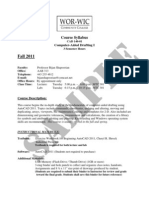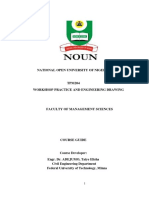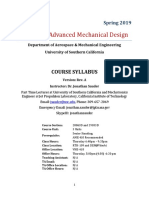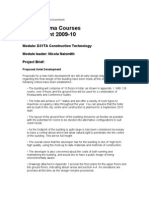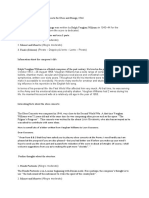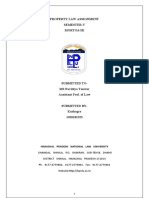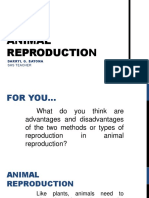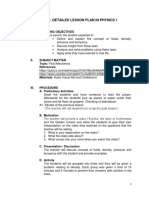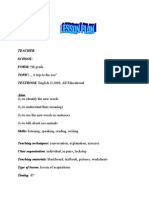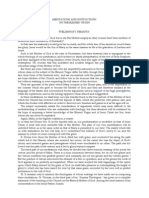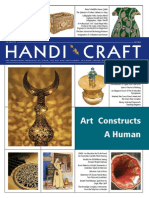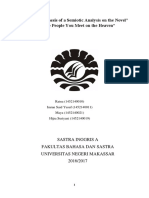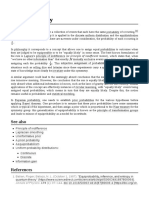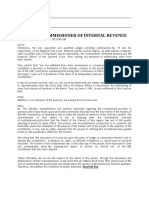Syllabus Senior Design I - Fall2014
Syllabus Senior Design I - Fall2014
Uploaded by
Sarah WilliamsCopyright:
Available Formats
Syllabus Senior Design I - Fall2014
Syllabus Senior Design I - Fall2014
Uploaded by
Sarah WilliamsOriginal Title
Copyright
Available Formats
Share this document
Did you find this document useful?
Is this content inappropriate?
Copyright:
Available Formats
Syllabus Senior Design I - Fall2014
Syllabus Senior Design I - Fall2014
Uploaded by
Sarah WilliamsCopyright:
Available Formats
SENIOR DESIGN I -SYLLABUS-FALL 2014
(Tentative Syllabus)
EAS4700C AEROSPACE DESIGN I
EML4501C MECHANICAL ENGINEERING DESIGN I
DESCRIPTION
Application of the design process in a Professional Team environment, using disciplined
Engineering and Project Management techniques that meet and exceed the Customers Needs.
Problems in the subject areas of Aerospace, Mechanical, thermo-fluid, material, electrical,
electronic, and software are considered.
OBJECTIVES
To introduce students to engineering design and the design process through applied engineering
related design projects. Emphasis shall be placed on professionalism, creativity, engineering,
design logic, and communication. Particular objectives are:
1. To present topics needed by a designer but not covered elsewhere
Robust design, decision theory, optimization.
Manufacturing processes, reliability.
Codes/standards, patents, litigation.
2. To foster awareness about different requirements during a design process
Requirement for role of creativity.
Requirement for continuing study.
Role of ethics.
3. To provide experience in writing/speaking/communication
OVERVIEW
Subject material in this course will include the design process, as well as design projects of
varying scales. In addition, the course will include material on selected subjects chosen to help
round out and bring together the students knowledge. The course will place emphasis on
initiative to develop definitions and formulate solution approaches. The course will rely on self-
learning in manner which is expected in the work force. A large and long-term project (fall
through spring) will be assigned to facilitate practical implementation of engineering design and
the design process.
This course is intended to complete the students engineering education. Thus, upon completion
of this course, the student must demonstrate:
ability to apply knowledge of mathematics, science and engineering;
ability to design systems, components and processes to meet desired needs;
ability to function in multi-disciplinary teams;
ability to identify, formulate and solve engineering problems;
understanding of professional and ethical responsibility;
ability to communicate effectively
ability to use the techniques, skill and modern engineering tools necessary for
engineering practice;
ability to understand the impact of engineering solutions in a global and societal context
Senior Design I fall 2014
knowledge of contemporary issues.
PREREQUISITES / CO-REQUISITES
ME Major: EML 3500 (Machine Design & Analysis)
EML 3701 (Fluid Mechanics I)
EML 3303 (Mechanical Engineering Measurements)
AE Major: EAS 3101 (Fundamental of Aerodynamics)
EAS 3800 (Aerospace Engineering Measurements)
EAS 4200 (Flight Structures)
EAS 4105 (Flight Mechanics)
INSTRUCTORS
1. Dr. Lionel Hewavitharana Office: ENG1-217 Phone: 407-823-1013
(Coordinator)
Email: lionel.hewavitharana@ucf.edu
2. Dr. Jan Gou Office: ENG 1 -407D Phone: 407-823-2155
Email: Jihau.Gou@ucf.edu
3. Dr. Olusegun Ilegbusi Office : ENG I -414 Phone : 407-823-1157
Email : Olusegun.Ilegbusi@ucf.edu
4. Dr. Nina Orlovoskaya Office : Eng I 407C Phone : 407-823-5770
Email : Nina.Orlovoskaya@ucf.edu
5. Dr. Yunjun Xu Office : Eng I -318 Phone : 407-823-1745
Email : Yunjun.Xu@ucf.edu
6. Dr. Tian Tian Office : Engr I -311 Phone : 407-823-6601
Email : Tian.Tian@ucf.edu
7. Dr. Gabriel Vazquez Office: ENG 1 345 Phone: 787-404-0316
Email: Vazquez@ucf.edu
8. Dr. Felix A. Soto-Toro Office: ENG 1 345 Phone: 407-760-0768
Email: felix@ucf.edu
9. Mr. Kurt Stresau Office: ENG1 267A Phone: (TBA)
Email: Kurt.Stresau@ucf.edu
SCHEDULE:
Class Time & Location: Monday, Wednesday 1:30 p.m. 2:20 p.m., CB2 0106
OFFICE HOURS: MW 3:30 p.m. to 5:30 p.m.
Senior Design I fall 2014
TEXT BOOK
Eggert, R. J., Engineering Design, 2nd Edition, High Peak Press, 2010.
GENERAL COURSE OUTLINE
1. Engineering design, product realization, engineering roles
2. Design problems
3. Formulating design problems
4. Concept design
5. Selecting materials
6. Selecting manufacturing processes
7. Configuration Design
8. Parametric Design
9. Building & testing prototypes
10. Design for X: Failure, safety
11. Human factors
12. Detail design
13. Projects, teamwork & ethics
ACHIEVING THE GRADE IN THIS COURSE
In this course engineering students experience the difference between Engineering-Analysis and
Engineering-Design. Typically analysis problems are well defined, with an objectively correct
answer. Design problems are not the same. They are open ended and do not have right or wrong
answers, only successful and unsuccessful answers.
Students will solve an Engineering Design problem by
Applying maximum creativity to develop a promising Design Concept.
Use Engineering Science to assess the functional and practical feasibility of the Design
Concept.
Use Practical reasoning to select Materials and Components to manufacture the design.
Use Project Management Techniques to formulate a Work Breakdown Structure (WBS),
Schedule and Budget for the Design Project
Produce sufficiently comprehensive Project and Engineering documentation to permit
actual construction of the designed object without any assistance from the Design
Engineer.
Recommendations
1. Obtain the TextBook
2. Listen to the Instructor
3. Attend the every lecture and class
4. Plan your work with a disciplined approach
5. Think Creatively
6. Think Systematically
Accurate documentation
The BluePrints must be complete and correct or production stops
7. Put in the time
Senior Design I fall 2014
A serious engineering student will spend 6-8 hours per week outside of this class
studying the course-material and creating the design
8. Contribute to your Team and Company
o Be a Team Player who meets his/her responsibilities, and commitments to the
Design effort
9. Stay on Schedule
o Engineering-Designs are built day by day; inconsistent effort almost always produces
inferior designs
o Have a sense of urgency from the beginning
10. Go beyond the required minimum!
SUPPLIES AND EQUIPMENT
Required
Course Text Book - Eggert, R. J., Engineering Design, 2nd Edition, High Peak Press,
2010.
Project Supplies Must adhere to the guidelines set out in the Mechanical and
Aerospace Engineering Purchasing/Reimbursement Guidelines and Agreement
Important point When buying supplies for the project they must be:
o Approved by the Faculty Advisor
o Shipped to MAE Dept not to your homes as these will not qualify for
reimbursement.
Others as Announced by the Instructor during the Course of the Semester
ATTENDANCE
Grade-Performance in this course correlates strongly with class attendance; students who attend
class sessions statistically receive better grades than students who miss lecture and/or related
activity sessions. The key to meeting the course goals is consistency Come to class every time
and complete every assignment on time.
Attendance will be taken at random lectures/class discussions. Faculty advisors will take
attendance in weekly meetings. All students are required to attend a minimum number of
presentations. All students are required to attend invited lectures and presentations.
Unauthorized absence in weekly meetings and class meetings may result in penalties that
would negatively affect the final grade.
WEEKLY REPORTS
During the Project Phase each student is required to submit a Weekly Status/Progress Report to
the Faculty Advisor. The template will be provided to students. All reports should be computer
generated. No hand written reports will be accepted. Weekly reports must be turned in at
group meetings, and should not be e-mailed. Violations will be penalized. Students should
provide an adequate description of work performed-in three to five sentences for each reporting
day in the week concerned. For example, just stating Worked on design, or Completed design
calculations will not provide any details. Failure to provide details will result loss of points.
Senior Design I fall 2014
Also, incorrectly numbered or dated weekly reports will be penalized resulting loss of
points.
The Weekly Progress Report (WPR) s should be unique amongst group members, and it should highlight
individual tasks, progress, and accomplishments as well as the results of your group meetings. Any WPR
numbered or dated incorrectly will lose points.
No weekly report will be accepted through emails under any circumstances.
Student should spend a minimum of 150 hrs. (total) on the senior design1. Accordingly, students
should plan on how much time they are going to spend in a week on the design project. Please
note that spending less than ten hours a week will result a grade penalty in your weekly
report grading.
EXAMS
At the end of the semester there will be a 90 minute exam. It will consist of Multiple
Choice Questions (MCQ s) only!
The exam is CLOSED-BOOK, CLOSED NOTES. All cell phones should be switched off
during exam time.
ASSIGNMENTS
Individual
Project Application Form
Weekly Report
Individual logbook
Final Exam
Peer Review Form
Performance Evaluation by Faculty
Assignments determined by the Instructor/faculty advisor
surveys
Team
Engineering Design Specification
Preliminary Design Report
Preliminary Design presentation
Critical Design Review presentation
Critical Design Report ( bound report color printed on high quality paper)
Team Logbook
Team Documentation binder
Note that late assignments will incur a 15% penalty (0.85 multiplier).
The instructor/faculty advisor may, solely at his discretion, accept late assignments in
extenuating circumstances.
Senior Design I fall 2014
PROFESSIONAL RELEVANCE
The Term Project is designed to approximate a typical First Assignment that a New-Grad
Engineer might receive upon starting a position with an Engineering Firm. The typical
expectations for an Engineer Starting his/her first job include:
Design Creativity
Application of Engineering Science
Accurate Calculations
Accurate Documentation
Professional Progress Reporting
Basic Project Engineering Skills to manage the Budget and Schedule
Ability to operate productively in a Team environment
Communication Skills needed to clearly Explain/Present the Design Solution to
Company-Management and/or OutSide-Customers
Compliance with Company Procedures
Compliance with relevant codes
TEAMWORK
Every students contribution toward the design creation must be proportionally equivalent to the
rest of the team. In other words, EVERY team member is expected to Pull his/her own Weight
in the Design Effort. If the senior design coordinator or the faculty advisor is not satisfied with
the performance/contribution of student/students, then he/they may be penalized to affect
his/their final grade.
DESIGN REVIEWS
The Project includes two FORMAL, PowerPoint-Based Design Review Presentations:
Preliminary Design Review (PDR). The purpose of the PDR is to review the conceptual
design to ensure that the planned technical approach will meet the requirements.
(This presentation is usually based on the Conceptual Design report)
Critical Design Review (CDR). The purpose of the CDR is to review the detailed design
to ensure that the design implementation has met the requirements.
(This presentation is usually based on the Critical Design report)
PROJECTS
At the beginning of the semester, design projects will be presented in the first two weeks. Based
upon your expression of interest and application, you will be assigned to a project and a team.
However, there is no guarantee that we can accommodate even your third choice. The design
must be carried through the conceptual and embodiment phases. This is the first of a two-
semester sequence. In the second semester, you will be required to complete the detail design
phase and build and test a prototype according to the design specifications selected. At the end
of the first semester Teams are required to prepare a Critical Design Review Report and
Presentation. At the end of the second semester a Final Report will be prepared by the team. This
details the teams work and integrates the various components into the complete design. The
entire team will be responsible for ensuring its completeness and organization. The submission
of all reports and completion of the assigned design projects are mandatory. Completion of the
prototype is a requirement of this course and completion is defined as the building, testing, and
Senior Design I fall 2014
evaluation of the prototype. Failure for any group (or any group member to actively
participate) to complete the prototype will result in an incomplete or fail grade. There will
be a limited number of projects that will have only modeling and simulations. Such
projects will be subjected to thorough scrutinizing and a different set of evaluation criteria
may apply. Additionally, each student will be required to maintain an engineering logbook of
the efforts on the project, keeping track of the time spent, the tasks being worked on, etc. The
logbook shall be submitted to the instructor at the time of the Final Examination.
PRESENTATIONS
Formal design reviews will be conducted as scheduled. During formal reviews, each team will be
limited to about 10 minutes, and each team member must participate. There will be maximum 5
minutes for Q&A. The slides are due the day before (3pm), and a copy of turned in slides should
be used in the presentation. Teams should have their presentations on flash drives in addition to
other storage methods. Technical difficulties encountered by teams will be penalized if
presentations do not start on time.
There will be presentations outside of class room time. Students will be
notified the time slots and venues at least one week before.
Student should have a sufficient flexibility in their schedules so that they can
accommodate presentations schedules.
All students are expected to professionally dress for presentations.
REPORTS
Formal written reports must be presented at the end of the conceptual and embodiment phases, as
noted below. The format to be followed will be provided later in class.
DEADLINES (TO BE ANNOUNCED IN CLASS)
Engineering Design Specification
Oral Presentation of Conceptual Design
Written Report of Conceptual Design (PDR report)
Oral Presentation of Parametric/Detailed Design (CDR presentation)
Written Report of Parametric/Detailed Design (CDR report color printed on high quality paper
and professionally bound. Single side printing only!)
Senior Design I fall 2014
GRADES
The course grade will be determined numerically as follows:
Written Design Requirements report/EDS 5%
Logbook and Documentation Management 5%
Performance Evaluation by Peer 5%
Weekly Reports (13 reports) 10%
Performance Evaluation by Faculty 10%
Written preliminary design report 10%
Preliminary design presentation 10%
Written parametric/Final design report
(CDR Report) 15%
Critical Design Review presentation 15%
Final Exam 15%
Please note that the faculty will look into various aspects before assigning the 10% faculty evaluation.
Some of those aspects may include, the conduct of the student during the project period, assessment of
individual student contribution to the project, individual log book, weekly meeting attendance, total
number of hours spent by the student during this semester, peer evaluation etc;
Final Grade:
Faculty Advisors instructing the senior design I in fall 2014 may decide to give grade pluses and
minuses. In the event they decide to do so, the scheme they use will be very close to the
following. However, each faculty advisor has the right to change lower/upper/lower &
upper bound/bounds to produce a reasonable grade distribution within the teams under
his/her supervision.
Student Final Average (SFA):
Student Final Average (SFA) 93 A
90SFA<93 A-
87 SFA < 90 B+
84 SFA < 87 B
80 SFA < 84 B-
77 SFA < 80 C+
74 SFA < 77 C
70 SFA < 74 C-
67 SFA < 70 D+
64 SFA < 67 D
60 SFA < 64 D-
0 SFA <60 F
Senior Design I fall 2014
STUDENTS NEEDING SPECIAL ACCOMODATIONS:
Students who need special accommodations are advised to meet with the instructor for further
advice.
Dr. Hewavitharana reserves the right to make changes to this syllabus as appropriate
during the semester. Any changes will be notified to students.
You might also like
- Social Justice Through Pedagogies of Multiliteracies - Developing and Strengthening L2 Learner Agency and Identity (Multiliteracies and Second Language Education)Document237 pagesSocial Justice Through Pedagogies of Multiliteracies - Developing and Strengthening L2 Learner Agency and Identity (Multiliteracies and Second Language Education)Irish Nomorosa100% (1)
- 2G Torque SpecsDocument37 pages2G Torque SpecsLuke Litten50% (6)
- Syllabus: ME 104, Mechanical Systems Design - Winter 2021Document6 pagesSyllabus: ME 104, Mechanical Systems Design - Winter 2021د.محمد كسابNo ratings yet
- Engg1000 Full Course Outline 2Document24 pagesEngg1000 Full Course Outline 2scribdacc123456No ratings yet
- CEN100 Course Outline2012Document8 pagesCEN100 Course Outline2012bane_razeNo ratings yet
- 402 SyllabusDocument6 pages402 SyllabusIraniya PandiyanNo ratings yet
- ENGR 4412: Senior Engineering Design I: Lecture 1 - SyllabusDocument25 pagesENGR 4412: Senior Engineering Design I: Lecture 1 - SyllabusHasen BebbaNo ratings yet
- Principles of Engineering Economic AnalysisDocument40 pagesPrinciples of Engineering Economic AnalysisSalih A. Razag Jr.50% (4)
- Njit Fed Ce SyllabusDocument6 pagesNjit Fed Ce Syllabusabdulrehman786No ratings yet
- Project Evaluation Form PDFDocument20 pagesProject Evaluation Form PDFMuneesh WariNo ratings yet
- Foundation Engineering - UtexasDocument8 pagesFoundation Engineering - UtexasAlvaroMartinezJunkoNo ratings yet
- Cornerstone Syllabus FreemanDocument4 pagesCornerstone Syllabus FreemanMalcolm LeClairNo ratings yet
- Course Syllabus CON E 401: Construction Planning & Scheduling Fall 2014Document10 pagesCourse Syllabus CON E 401: Construction Planning & Scheduling Fall 2014giorgiNo ratings yet
- ENS1154 Unit Plan S1 - 2013 v1.0Document11 pagesENS1154 Unit Plan S1 - 2013 v1.0Tim BrosnahanNo ratings yet
- ENGR3222 Syllabus Fall 2023Document6 pagesENGR3222 Syllabus Fall 2023otakageme20022349No ratings yet
- Civil Eng Communications Handbook 2019-20Document13 pagesCivil Eng Communications Handbook 2019-20Sarah HaiderNo ratings yet
- About The Project: Amity School of Engineering and TechnologyDocument12 pagesAbout The Project: Amity School of Engineering and TechnologyRohit ShangleNo ratings yet
- INFS1609 Fundamental of Business Programming S22012Document9 pagesINFS1609 Fundamental of Business Programming S22012Thu Hà TrươngNo ratings yet
- Project Guidelines 2011Document31 pagesProject Guidelines 2011Russell FarrugiaNo ratings yet
- 038RDScw1Design11-12 sm1Document13 pages038RDScw1Design11-12 sm1Palak ChandraNo ratings yet
- I. Course Data: Fran@engr - Siu.edu Weston@engr - Siu.eduDocument5 pagesI. Course Data: Fran@engr - Siu.edu Weston@engr - Siu.eduDregasNo ratings yet
- Guidelines On Writing A Graduate Project Thesis: Eelo University, Computer Science DepartmentDocument3 pagesGuidelines On Writing A Graduate Project Thesis: Eelo University, Computer Science DepartmentSeventh AzuzNo ratings yet
- Course Objectives: MENG 487/488 - Mechanical Design: Process and ImplementationDocument5 pagesCourse Objectives: MENG 487/488 - Mechanical Design: Process and ImplementationwalterbircherNo ratings yet
- CSCE 3513 Syllabus - Fall 2021Document5 pagesCSCE 3513 Syllabus - Fall 2021Nathan SmithNo ratings yet
- AME 441 SyllabusDocument24 pagesAME 441 Syllabuswein.hsu012No ratings yet
- Practice and Ethics. Nelson/Thomson Canada Ltd. Toronto. ISBNDocument4 pagesPractice and Ethics. Nelson/Thomson Canada Ltd. Toronto. ISBNNavneet Sidhu ThandiNo ratings yet
- TECB 213 Course Outline - Special Sem 20132014Document5 pagesTECB 213 Course Outline - Special Sem 20132014Shaarveen RajNo ratings yet
- INF2011 Course OutlineDocument5 pagesINF2011 Course Outlineaphanedave20No ratings yet
- Senior DesignI Fall 2014 IntroductionDocument31 pagesSenior DesignI Fall 2014 IntroductionSarah WilliamsNo ratings yet
- CAD 140 SampleDocument4 pagesCAD 140 Samplemirasol_armadaNo ratings yet
- Eeng405 Graduation Design Project ProposalDocument12 pagesEeng405 Graduation Design Project ProposalSeid TakeleNo ratings yet
- IT 115 Design Documentation Syllabus WED Spring 16Document14 pagesIT 115 Design Documentation Syllabus WED Spring 16Rider TorqueNo ratings yet
- MEEN 601 - Fall 2022 - SyllabusDocument9 pagesMEEN 601 - Fall 2022 - SyllabusFahad AhmedNo ratings yet
- Cmpe 295aDocument10 pagesCmpe 295aShanmuganathanTrNo ratings yet
- Lifting Platform Design Assign Mment Brief 1314Document20 pagesLifting Platform Design Assign Mment Brief 1314tony makNo ratings yet
- Course Syllabus: ENES 100 Introduction To Engineering Design Spring 2013Document6 pagesCourse Syllabus: ENES 100 Introduction To Engineering Design Spring 2013concrete_hikerNo ratings yet
- Syllabus - PETE 615 - Spring 2023Document8 pagesSyllabus - PETE 615 - Spring 2023Rifan MahulauwNo ratings yet
- ELEC3730 Course Outline 2014S1Document6 pagesELEC3730 Course Outline 2014S1May Su Sandy LwinNo ratings yet
- Gwizdka HCI Projects Syllabus Spring2018 Rev FULLDocument13 pagesGwizdka HCI Projects Syllabus Spring2018 Rev FULLsarthakwaykar1804No ratings yet
- Sem 1 Week 01 Intro To Individual ProjectsDocument17 pagesSem 1 Week 01 Intro To Individual ProjectsAmar BeheraNo ratings yet
- Civil Engineering Masters Thesis TopicsDocument5 pagesCivil Engineering Masters Thesis TopicsCollegePaperGhostWriterUK100% (2)
- Tpm204 Workshop Practice and Engineering Drawing Updated DR Adejumo Taiye - 0Document229 pagesTpm204 Workshop Practice and Engineering Drawing Updated DR Adejumo Taiye - 0Sagir Musa SaniNo ratings yet
- De-2A - 5th Sem - Course AbstractDocument8 pagesDe-2A - 5th Sem - Course Abstractrajain135No ratings yet
- Emedr2a - Learner Guide - 2022Document20 pagesEmedr2a - Learner Guide - 2022em97.santosNo ratings yet
- ENC 3246 SyllabusDocument8 pagesENC 3246 SyllabusJack KennedyNo ratings yet
- Main File Projguidelines 12janDocument79 pagesMain File Projguidelines 12janVenky VenkateshNo ratings yet
- University of Mumbai: General Guidelines For The StudentsDocument5 pagesUniversity of Mumbai: General Guidelines For The StudentsSudhakar DasojuNo ratings yet
- EE4080 Final Year Project - OBTLDocument5 pagesEE4080 Final Year Project - OBTLAaron TanNo ratings yet
- A Syllabus ConstructionDocument4 pagesA Syllabus ConstructionNguyen Thanh CongNo ratings yet
- Course Objectives: MENG 487/488 - Mechanical Design: Process and ImplementationDocument8 pagesCourse Objectives: MENG 487/488 - Mechanical Design: Process and ImplementationjohnnyNo ratings yet
- Final Year Project Handbook COMPDocument36 pagesFinal Year Project Handbook COMPGamer HouzwalaNo ratings yet
- ISM 699: Project in Information Technology: Instructor: Office: Office Phone: Fax: E-Mail: Office HoursDocument3 pagesISM 699: Project in Information Technology: Instructor: Office: Office Phone: Fax: E-Mail: Office HoursAkmad Ali AbdulNo ratings yet
- AME 503: Advanced Mechanical Design: Course SyllabusDocument11 pagesAME 503: Advanced Mechanical Design: Course Syllabuskhalil alhatabNo ratings yet
- CIVE 4750 Syllabus 2021S V2Document9 pagesCIVE 4750 Syllabus 2021S V2Liu ZhenguoNo ratings yet
- CIVE 4750 Syllabus 2021S V4Document9 pagesCIVE 4750 Syllabus 2021S V4Liu ZhenguoNo ratings yet
- FABDocument78 pagesFABMkhairi HassanNo ratings yet
- Thesis Manual Revised 2014Document32 pagesThesis Manual Revised 2014Ernest Ian GuzmanNo ratings yet
- Msc/Diploma Courses Assignment 2009-10Document12 pagesMsc/Diploma Courses Assignment 2009-10Zahid MamoodNo ratings yet
- IENG43xx - Product Design & DevelopmentDocument11 pagesIENG43xx - Product Design & DevelopmentSri Susilawati IslamNo ratings yet
- EMAE 360 SyllabusDocument5 pagesEMAE 360 SyllabusKristan TybuszewskiNo ratings yet
- Level 6 BEng BSC Project AssignmentsDocument7 pagesLevel 6 BEng BSC Project AssignmentsrodwellheadNo ratings yet
- UCF Degree Programs: Photography (B.S.)Document2 pagesUCF Degree Programs: Photography (B.S.)Sarah WilliamsNo ratings yet
- Fall 2011 COP 3223 (C Programming) Syllabus: Will Provide The Specifics To His SectionDocument5 pagesFall 2011 COP 3223 (C Programming) Syllabus: Will Provide The Specifics To His SectionSarah WilliamsNo ratings yet
- (Part 2) SAE Intake Concepts Using Ricardo WAVE-VECTIS 1D-3D Coupled Modeling TechniquesDocument25 pages(Part 2) SAE Intake Concepts Using Ricardo WAVE-VECTIS 1D-3D Coupled Modeling TechniquesSarah WilliamsNo ratings yet
- (Part 1) SAE Intake Concepts Using Ricardo WAVE-VECTIS 1D-3D Coupled Modeling TechniquesDocument24 pages(Part 1) SAE Intake Concepts Using Ricardo WAVE-VECTIS 1D-3D Coupled Modeling TechniquesSarah WilliamsNo ratings yet
- Senior DesignI Fall 2014 IntroductionDocument31 pagesSenior DesignI Fall 2014 IntroductionSarah WilliamsNo ratings yet
- 1 - Belmont at The Big A RETROSPECTODocument12 pages1 - Belmont at The Big A RETROSPECTOJesús Figueroa100% (1)
- Is 4732Document9 pagesIs 4732Vaish NaoNo ratings yet
- I. Objective: at The End of The Lesson, The Students Are Expected ToDocument2 pagesI. Objective: at The End of The Lesson, The Students Are Expected ToGerome LopezNo ratings yet
- Productivity Game PDF Package - Jan 2019 PDFDocument95 pagesProductivity Game PDF Package - Jan 2019 PDFethan90% (10)
- Chapter 17 - Chemical ThermodynamicsDocument69 pagesChapter 17 - Chemical ThermodynamicsAnand MurugananthamNo ratings yet
- Vaughan Williams Oboe ConcertoDocument2 pagesVaughan Williams Oboe ConcertoStefani EmilovaNo ratings yet
- Property Law Assignment Semester-V Mortgage: II II II II IDocument25 pagesProperty Law Assignment Semester-V Mortgage: II II II II IAanand SinghNo ratings yet
- Deloitte - Illustrative Financial Statements For BanksDocument288 pagesDeloitte - Illustrative Financial Statements For BanksErwincont100% (1)
- Animal Reproduction: Darryl G. BayonaDocument23 pagesAnimal Reproduction: Darryl G. BayonaYvonne Alonzo De BelenNo ratings yet
- Lesson Plan in PhysicsDocument3 pagesLesson Plan in PhysicsJhervhee A. ArapanNo ratings yet
- A Trip To ZooDocument4 pagesA Trip To Zooc_stepan60290% (1)
- Drinking - Drinking Vessels - Silver TankardsDocument117 pagesDrinking - Drinking Vessels - Silver TankardsThe 18th Century Material Culture Resource Center100% (1)
- Managing Digital Transformations: Name of The FacultyDocument6 pagesManaging Digital Transformations: Name of The FacultyAkshayNo ratings yet
- Xc6erhcbi - Why Should Teachers Study Philosophy of Educatio1Document2 pagesXc6erhcbi - Why Should Teachers Study Philosophy of Educatio1yvette gimenaNo ratings yet
- Mariology I FR VermeerschDocument15 pagesMariology I FR VermeerschQuo Primum100% (1)
- Pestilos vs. GenerosoDocument10 pagesPestilos vs. GenerosoTin Tin0% (1)
- Emotional Intelligence in The Workplace 2023Document53 pagesEmotional Intelligence in The Workplace 2023ginishaverma09No ratings yet
- Cover Letter For Scholarship ProgramDocument6 pagesCover Letter For Scholarship Programbcqxqha3100% (3)
- 2019009-Constiution-3rd SemDocument17 pages2019009-Constiution-3rd SemAkshara AdibhatlaNo ratings yet
- Peric Etiology and Pathogenesis of Paranasal Sinus MucocelesDocument7 pagesPeric Etiology and Pathogenesis of Paranasal Sinus MucocelesMahmud UglicNo ratings yet
- Dergi13 Eng PDFDocument164 pagesDergi13 Eng PDFHakan Kağan100% (2)
- Analysis The Thesis of A Semiotic Analysis On The Novel" The Five People You Meet On The Heaven"Document3 pagesAnalysis The Thesis of A Semiotic Analysis On The Novel" The Five People You Meet On The Heaven"Imran Said YusufNo ratings yet
- EquiprobabilityDocument2 pagesEquiprobabilitydanny222No ratings yet
- Cluster Analysis and Multidimensional Scaling Ignou PDFDocument11 pagesCluster Analysis and Multidimensional Scaling Ignou PDFbharticNo ratings yet
- List of Spells Harry Potter Wiki FandomDocument1 pageList of Spells Harry Potter Wiki FandomAmsi NNo ratings yet
- Section 8.6.4 Solution With Axial ConductionDocument14 pagesSection 8.6.4 Solution With Axial Conductiondrdoak123No ratings yet
- Nitafan vs. Commissioner of Internal RevenueDocument1 pageNitafan vs. Commissioner of Internal RevenueRheinhart PahilaNo ratings yet
- Ayesha 2013503630 - MIS 107mid1 (Chapters 1, 4 & 7) (Sec21) Summer2021Document6 pagesAyesha 2013503630 - MIS 107mid1 (Chapters 1, 4 & 7) (Sec21) Summer2021Ayesha Rahman100% (1)
- Dissertation Skills GainedDocument5 pagesDissertation Skills GainedWriteMyPaperApaStyleLasVegas100% (1)




